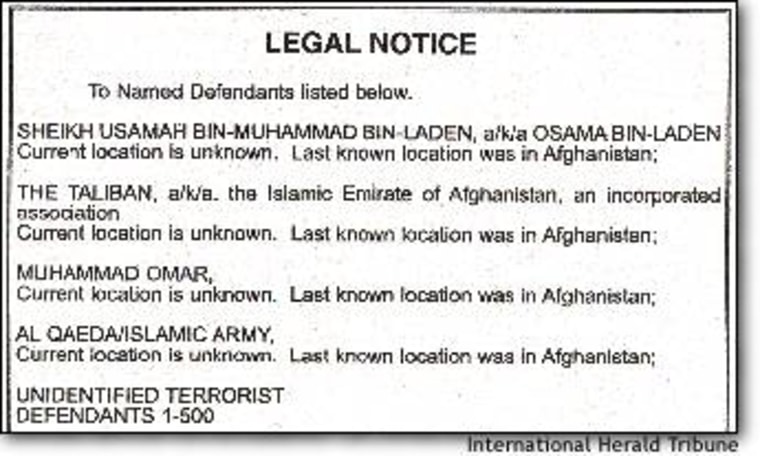Although thousands of U.S. troops are on the lookout for Osama bin Laden in Afghanistan, the families of 9/11 victims seeking billions of dollars in damages from the terror mastermind are taking a different approach: placing newspaper advertisements in English and Arabic asking bin Laden to get in touch with their U.S. attorneys.
FOR THE LAST six weeks, lawyers for seven families of victims of the World Trade Center attacks have placed advertisements in the International Herald Tribune and Al-Quds Al-Arabi, a London-based Arabic newspaper. The last in the series of advertisements ran this week in the classified sections of both papers.
The class-action lawsuit filed in February seeks more than $1 billion compensatory damages and $100 billion in punitive damages from bin Laden and his al-Qaida terror network, blaming them for the 9/11 attacks.
Also named in the lawsuit are the Taliban and its leader, Mullah Mohammed Omar, who harbored bin Laden in Afghanistan, the 19 hijackers who commandeered commercial planes on Sept. 11, 2001, and Iran and Iraq, which the suit says provided material support for the attacks.
The advertisements in the International Herald Tribune, an English-language paper distributed in dozens of countries, and Al-Quds Al-Arabi address bin Laden directly, requesting that he contact the U.S. District Court in Washington, where the suit was filed, or the plaintiffs’ lawyers in Pennsylvania.

ADDRESS UNKNOWN
For bin Laden’s address, the legal notice says, “Current location is unknown. Last known location was Afghanistan.”
Thomas Mellon, lead lawyer for the victims’ families, said the advertisements stemmed from the legal process of the case, rather than a belief that bin Laden was reading either paper or willing to contact the plaintiffs.
“No, we have not received a response,” Mellon said by phone from Pennsylvania. He said that on behalf of his clients he was attempting to give bin Laden and the other defendants named in the suit “adequate service of process by publication” — or notification of the judgment being sought against them. If bin Laden does not respond within 60 days of the publication of the last notice, Mellon said he will ask the judge in the case, James Robertson, to move for a default judgment.
If he succeeds, the victims’ families could have access to funds and assets seized by the U.S. government in its pursuit of terrorist organizations.
REACHING BIN LADEN
The International Herald Tribune and Al-Quds Al-Arabi have a worldwide distribution of 263,878 and 75,000, respectively, according to the papers.
After years of living in Afghanistan, where he is presumed by the U.S. military to be in hiding today, bin Laden’s reading habits in the isolated nation are not known. In one of the several videos bin Laden has appeared in since the attacks, he made reference to listening to a radio on the day the World Trade Center towers were destroyed.
The multibillion-dollar suit filed by the seven families in Washington was later joined by a $1 trillion lawsuit on behalf of 600 families that names the Saudi Arabian government, international banks and Islamic organizations as sharing responsibility for the 9/11 attacks. The first suit is considered easier to win, as the defendants are not expected to show up in court.
Although Mellon said the newspaper advertisements were used to “begin the legal process,” the independent Al-Quds Al-Arabi has been associated with bin Laden in the past.
IN TOUCH WITH BIN LADEN
The paper’s editor, Abdel Bari Atwan, interviewed bin Laden in 1998 in Afghanistan. As recently as two months ago, Al-Quds Al-Arabi claimed to publish an e-mail from the Saudi exile.
Lawyer Mellon said bin Laden’s appearance in the paper played a role in its selection for the plaintiffs’ advertisement.
“Bin Laden has been known to publish proclamations and give interviews to reporters from that newspaper,” he said.
Widely respected for its independent views, Al-Quds Al-Arabi has held a variety of stances over the years. It takes a rare critical approach for an Arab-language publication toward Arab regimes in the Middle East — a position that has its issues banned in Saudi Arabia and Syria. Egypt frequently limits its distribution.
Editor Atwan said his paper had “no response” from bin Laden. He said he doubted his paper would end up in bin Laden’s hands. “We took the advertisement for commercial reasons,” he said.
Preston Mendenhall is MSNBC.com’s international editor.